Reflections on our first Unlearning White Supremacy discussion group
It has been over a week since our Unlearning White Supremacy discussion group met for the first time. I still get fuzzy feelings thinking about the number of people who showed up to discuss how we can resist white supremacy culture. :)
Here is a bit of an overview of what happened.
Discussion group overview
After some introductions and a group communication agreement, we broke off into smaller groups. Each group briefly discussed white supremacy and tried to define it. The discussion was followed by smaller group discussions on some of the elements of white supremacy culture.
Using material created by Kenneth Jones and Tema Okun, each group worked through two elements of White supremacy culture by asking:
- Where do you see this in your life?
- Who benefits?
- And, how can it be resisted?
Like these elements of white supremacy culture, the information that AVP brings to these discussion groups has been stated innumerable times by people of colour and Indigenous people. The topics we bring to these groups are not new. So, I invite you to consider this next part as a personal reflection.
A note on perfectionism
One of the cards we focused on was perfectionism. I want to be honest: the idea that perfectionism upholds white supremacy culture by compelling us to focus on each other’s mistakes and inadequacies has been kind of a game changer for me (a cis-gender white dude who received various resources throughout my life due to white privilege).
It seems there is a tendency in cultures of domination, like white supremacy culture, to define individuals by their actions. In this model, my mistakes come to stand in for me. In other words, my mistakes make me a mistake and, therefore, a bad person.
I think the conflation of making a mistake and being a mistake is a problem that arises often for people engaging in social justice work, particularly ones which seeks to challenge systems of power like white supremacy. When I reflect on my own experiences, I can remember many times that I have failed to challenge or resist racist behaviour, due to a fear that I might make a mistake — fear that I might not be perfect.
And, in remembering all these times of inaction, I suddenly feel a little more awful than I did a minute ago: queue vicious self-shame cycle.
In a recent blogpost, Alexis Shotwell argues that we would do better by aiming for “a politics of imperfection” because, although we may not be perfect, we all can offer care, help, solidarity, and presence in the world that we live in.
Holding ourselves to the standard of perfection only works to demobilize our efforts to try and be more caring and loving humans.
So, let’s just not.
Let’s hold ourselves and each other accountable for the actions and behaviour that produce and reproduce systemic violence, but let’s do so in a loving and caring way that recognizes that every person has value.
Our first Unlearning White Supremacy discussion group was not perfect. We had limited space and limited food. And we failed to make it clear that we had a no late-comer policy, which resulted in us having to turn folks away who had made the effort to come to the group.
We’re sorry for that, but we can’t let these mistakes prevent us from trying to do better next time.
No one is inherently bad. It is our messed-up culture of domination, which is a product of colonial white supremacist capitalist heteropatriarchy, that teaches people to do shitty shit. However, no one is inherently good either. We all have the capacity to make mistakes and cause harm. When we realize this, it might just make it easier to hold ourselves and others accountable in a loving and respectful way.
So, to quote Shotwell: “Let us be imperfect, for we are, but let us be brave too.”







